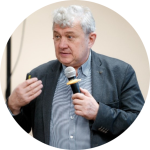SMILE: Supporting start-ups and scale-ups in smart manufacturing
In this interview, Olena Soltmann, SMILE project coordinator, and Ivan Kulchytskyy from the Agency of European Innovations (AEI), discuss their roles in the SMILE project. Learn more about how this project fosters innovation in smart manufacturing through international collaboration.
Could you tell us a bit about yourself and your job role?
 Olena Soltmann: As the SMILE project coordinator, I am deeply engaged with the project’s concepts. The SMILE consortium unites experts from various fields related to smart manufacturing, enabling an inter-disciplinary approach to manufacturing challenges from technological, societal, ecological and environmental perspectives. SMILE is not only an initiative for industry cooperation but also for intensified international collaboration. Our consortium includes partners from Germany, Italy, Denmark and Ukraine. Cultural context is crucial for innovation. Success in one country may not guarantee optimal results in another due to different conditions. By examining manufacturing challenges from the viewpoints of various countries, we gain a more comprehensive understanding of the innovation and entrepreneurial potential for smart manufacturing.
Olena Soltmann: As the SMILE project coordinator, I am deeply engaged with the project’s concepts. The SMILE consortium unites experts from various fields related to smart manufacturing, enabling an inter-disciplinary approach to manufacturing challenges from technological, societal, ecological and environmental perspectives. SMILE is not only an initiative for industry cooperation but also for intensified international collaboration. Our consortium includes partners from Germany, Italy, Denmark and Ukraine. Cultural context is crucial for innovation. Success in one country may not guarantee optimal results in another due to different conditions. By examining manufacturing challenges from the viewpoints of various countries, we gain a more comprehensive understanding of the innovation and entrepreneurial potential for smart manufacturing.
 Ivan Kulchytskyy: The AEI and I became involved in SMILE through the EIT HEI Initiative to support Ukraine after the project had already begun. Together with Ternopil Ivan Puluj National Technical University (TNTU), we joined SMILE as a full partner. Although we did not contribute to the project’s initial ideas, we are committed and actively participate in the consortium, representing Western Ukraine.
Ivan Kulchytskyy: The AEI and I became involved in SMILE through the EIT HEI Initiative to support Ukraine after the project had already begun. Together with Ternopil Ivan Puluj National Technical University (TNTU), we joined SMILE as a full partner. Although we did not contribute to the project’s initial ideas, we are committed and actively participate in the consortium, representing Western Ukraine.
Could you tell us a bit about the SMILE project?
Olena: SMILE was launched in 2022 as part of Cohort 2 of the EIT HEI Initiative projects to accelerate institutional change towards innovation and entrepreneurship in smart manufacturing. Key strategic points of SMILE include innovation orientation, mutual learning and open entrepreneurship. Central to SMILE is scouting, which we understand broadly as the search for smart manufacturing technologies and solutions, unlocking untapped knowledge and identifying innovation opportunities. These opportunities include partnerships, initiatives and acquiring entrepreneurial talent – from students and graduates to professionals in manufacturing and technology transfer. This approach, combined with innovation-oriented governance and learning, facilitates smart manufacturing innovation and strengthens interactions between academia and industry.
Integral to SMILE are innovative training and mentoring sessions, along with a smart manufacturing hackathon addressing real-world challenges. This is supported by digital learning nuggets (short educational videos) and digital learning labs as experimental spaces and implementation models for SMILE’s educational technology. One notable achievement of SMILE has been the business solution hackathons. We engaged eight companies from Germany, Italy, Turkey and Ukraine, addressing challenges from environmental and ecological aspects to the needs of digitalisation and flexible manufacturing and logistics. Around 230 students registered for the hackathon, presenting their solutions in 52 pitch videos. This highlights the relevance of innovative, challenge-based learning activities in a dynamic business environment.
What were the biggest challenges that you faced during the project implementation and how did you overcome them?
Ivan: Representing the Ukrainian part of the SMILE consortium, I focused on supporting Ukrainian start-ups and scale-up companies. A significant challenge was adapting the best European university practices to Ukrainian conditions. Many companies had to relocate from eastern to western Ukraine, facing new supply chains, adapting their processes and assimilating to new ecosystems. Ukrainian companies are very interested in the European market, creating a strong demand for European research and innovation, particularly in digital and environmental areas. Upskilling businesses and academia to support companies in this challenging setting is also crucial.
Olena: SMILE focuses on mutual learning, incorporating experiences from consortium partners and ecosystems. A significant challenge was collaborating with and among ecosystems to enhance the economy and society’s resilience to unexpected changes and new business conditions. Business ecosystems serve as a foundation for new players with innovative ideas and services, making collaboration essential.
Could you tell us a bit more about the Ukrainian start-ups supported through SMILE?
Ivan: AEI supported two early-stage start-ups with ambitions to develop their products and expand their markets.
One of them, 482.Solutions LTD, specialises in industrial Web3 and blockchain-based solutions in green energy, green finance and sustainable value chains. The company follows the ESG (environmental, social and governance) approach using Web3 and blockchain technology to develop an infrastructure for open energy, voluntary carbon and green finance markets, providing traceability and transparency for ESG data and sustainable digital asset management. Since 2020, they have been developing Electrodo, an ESG data and asset management platform to help companies and investors create sustainable value.
The second start-up, Waste Ukraine Analytics (WUA), is a platform facilitating the transition to a circular economy by collecting, processing and providing open data in waste management. WUA assists local governments in preparing legally required data and offers products like a B2B marketplace for waste companies, an historical waste data aggregator and an AI-based tool for creating mandatory datasets for local communities.
Olena: Additionally, in 2023, SMILE supported two scale-ups involving researchers from TNTU. SPE Teplobak and LLC VS Ventsol aim for potential growth, requiring optimisation of production processes and staff training for innovations. SMILE also involved other companies by presenting real challenges during the hackathon. The Ukrainian Scale Company focused on digitalising production processes after relocating to western Ukraine. Agricon, a leading agricultural solutions provider, aimed to enhance its waste management system.
How did you involve or reach out to those start-ups for providing a support?
Ivan: AEI is prominent in the Ukrainian innovation ecosystem, organising events for start-ups and small and medium-sized enterprises, preparing innovative projects and attracting funding. Start-ups engaged in SMILE participated in our events promoting European funding opportunities. SMILE shared project materials and information about the EIT HEI Initiative and SMILE possibilities. AEI also communicates these opportunities at various conferences and brokerage meetings. TNTU, another Ukrainian partner, understands the needs of companies in the Ternopil region, attracting companies via network channels and direct communication.
What type of support did the start-ups receive from the SMILE project?
Ivan: In SMILE, we focused on mentoring companies for innovation in smart manufacturing. For Ukrainian companies, we identified those interested in the European market but lacking experience or understanding of market expectations and innovation. Start-ups and scale-ups received mentoring from AEI business consultants and TNTU researchers, including business needs assessment, technical evaluation and improvement suggestions. AEI also facilitated fundraising plans, identified relevant Horizon Europe and Digital Europe calls for proposals, and supported application preparation. An essential support aspect was training key employees in smart manufacturing innovation. We also provided information on international business events and brokerage meetings to help companies forge partnerships and networks focused on innovation.
What are the next steps for SMILE?
Ivan: We will continue working with the business and innovation ecosystem to facilitate knowledge transfer on smart manufacturing. Our goal is to bring world-class manufacturing solutions to the Ukrainian market, addressing not only digital and technological challenges but also societal challenges such as climate change, resilience and inclusiveness.
Olena: SMILE aims to enhance collaboration within our partnership and with other smart manufacturing partnerships. We plan to extend our scouting efforts to identify companies ready to innovate and raise awareness of smart manufacturing practices, technologies and solutions. Our objective is to support companies through the transition to smart manufacturing, providing stage-by-stage assistance. SMILE’s story will continue beyond the project’s end as we explore new ideas for fostering innovation and entrepreneurship.
Share your experience with the EIT HEI Initiative and inspire higher education institutions across Europe to boost their innovation and entrepreneurship capacity.
Published on: 01 August 2024